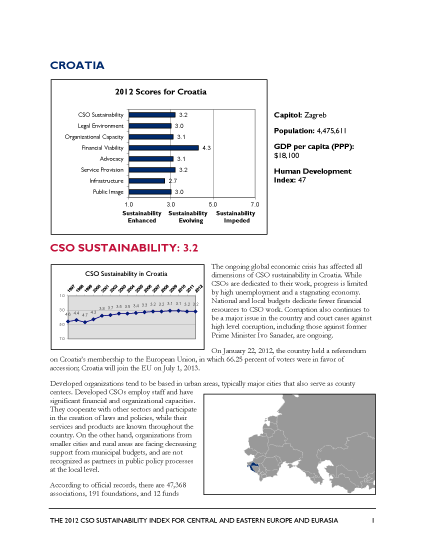CSO SUSTAINABILITY: 3.2
The ongoing global economic crisis has affected all dimensions of CSO sustainability in Croatia. While CSOs are dedicated to their work, progress is limited by high unemployment and a stagnating economy. National and local budgets dedicate fewer financial resources to CSO work. Corruption also continues to be a major issue in the country and court cases against high level corruption, including those against former Prime Minister Ivo Sanader, are ongoing.
On January 22, 2012, the country held a referendum on Croatia’s membership to the European Union, in which 66.25 percent of voters were in favor of accession; Croatia will join the EU on July 1, 2013. Developed organizations tend to be based in urban areas, typically major cities that also serve as county centers. Developed CSOs employ staff and have significant financial and organizational capacities. They cooperate with other sectors and participate in the creation of laws and policies, while their services and products are known throughout the country. On the other hand, organizations from smaller cities and rural areas are facing decreasing support from municipal budgets, and are not recognized as partners in public policy processes at the local level.
According to official records, there are 47,368 associations, 191 foundations, and 12 funds registered in Croatia. Sports organizations account for 35 percent of all associations, followed by cultural organizations (15 percent) and economic organizations (10 percent). CSOs must register with the Ministry of Finance in order to access state funding at both the local and national levels. Approximately 21,500 CSOs are included in the Register of Non-Profit Organizations managed by the Ministry of Finance, which may present a more realistic picture of the number of active organizations in the sector.








Comment
Make a general inquiry or suggest an improvement.